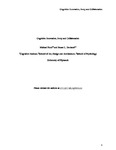Cognitive Innovation, Irony and Collaboration
| dc.contributor.author | Punt, Michael | |
| dc.contributor.author | denham, susan | |
| dc.contributor.author | Denham, SE | |
| dc.date.accessioned | 2017-10-27T20:10:28Z | |
| dc.date.issued | 2017-11-21 | |
| dc.identifier.issn | 2082-6710 | |
| dc.identifier.issn | 2082-6710 | |
| dc.identifier.uri | http://hdl.handle.net/10026.1/10106 | |
| dc.description.abstract |
What seems clear from the experiences of researchers in CogNovo is that the concept of cognitive innovation offered a new vocabulary, and thus a clear space, within which creativity could be explored free from the baggage of prior conflicting definitions. The concept was, from its inception, intrinsically ironic in the sense that Richard Rorty developed the term. Although initially we did not fully appreciate the potential this offered, approaching creativity under the rubric of cognitive innovation led to novel ideas that would not have emerged if we had taken a more conventional discipline-led approach. One example was expressing creativity as a mathematical function and as a media form in a parallel text. The absurdity of describing a process of such complexity in this form did not pass us by. However, this self-conscious irony, not a common rhetorical strategy in the sciences, clarified our understanding of cognitive innovation as a recursive function that allowed us to express a continuity between the basic life processes of exploration, innovation and the construction of the self, and the social and cultural ramifications of these processes; creativity. It led us to conclude that cognitive innovation furnishes a view of the self as a dynamic entity, for whom reality and novelty are contingent on one's current state, both of which can change and be changed, and offers a means for enhancing the rigor of the current debate on what counts as creative. It also reveals the value of irony in not disavowing the inevitability of multiple perspectives and prospectives on reality, and consequently offers a way to avoid unnecessary reductivism. In this paper, we will argue, as we take the insights of CogNovo forward, that irony offers a hitherto unappreciated strategy for collaborative research. | |
| dc.format.extent | 17-23 | |
| dc.language.iso | en | |
| dc.publisher | Centre for Philosophical Research | |
| dc.title | Cognitive Innovation, Irony and Collaboration | |
| dc.type | journal-article | |
| dc.type | Journal Article | |
| plymouth.issue | Special | |
| plymouth.volume | VIII | |
| plymouth.publication-status | Published online | |
| plymouth.journal | Avant: Journal of Philosophical-Interdisciplinary Vanguard | |
| dc.identifier.doi | 10.26913/80s02017.0111.0002 | |
| plymouth.organisational-group | /Plymouth | |
| plymouth.organisational-group | /Plymouth/Admin Group - REF | |
| plymouth.organisational-group | /Plymouth/Admin Group - REF/REF Admin Group - FoAH | |
| plymouth.organisational-group | /Plymouth/Faculty of Arts, Humanities and Business | |
| plymouth.organisational-group | /Plymouth/Faculty of Arts, Humanities and Business/School of Art, Design and Architecture | |
| plymouth.organisational-group | /Plymouth/REF 2021 Researchers by UoA | |
| plymouth.organisational-group | /Plymouth/REF 2021 Researchers by UoA/UoA04 Psychology, Psychiatry and Neuroscience | |
| plymouth.organisational-group | /Plymouth/REF 2021 Researchers by UoA/UoA32 Art and Design: History, Practice and Theory | |
| plymouth.organisational-group | /Plymouth/Research Groups | |
| plymouth.organisational-group | /Plymouth/Research Groups/Centre for Brain, Cognition and Behaviour (CBCB) | |
| plymouth.organisational-group | /Plymouth/Research Groups/Centre for Brain, Cognition and Behaviour (CBCB)/Brain | |
| plymouth.organisational-group | /Plymouth/Users by role | |
| plymouth.organisational-group | /Plymouth/Users by role/Academics | |
| plymouth.organisational-group | /Plymouth/Users by role/Researchers in ResearchFish submission | |
| dcterms.dateAccepted | 2017-09-26 | |
| dc.identifier.eissn | 2082-6710 | |
| dc.rights.embargoperiod | Not known | |
| rioxxterms.versionofrecord | 10.26913/80s02017.0111.0002 | |
| rioxxterms.licenseref.uri | http://www.rioxx.net/licenses/all-rights-reserved | |
| rioxxterms.licenseref.startdate | 2017-11-21 | |
| rioxxterms.type | Journal Article/Review |


